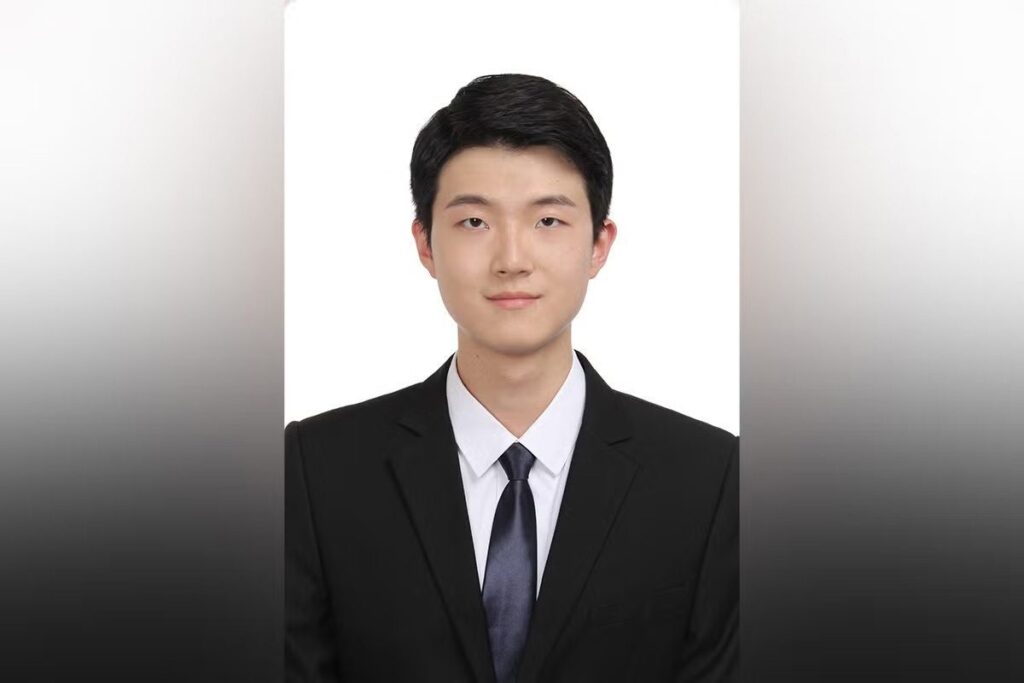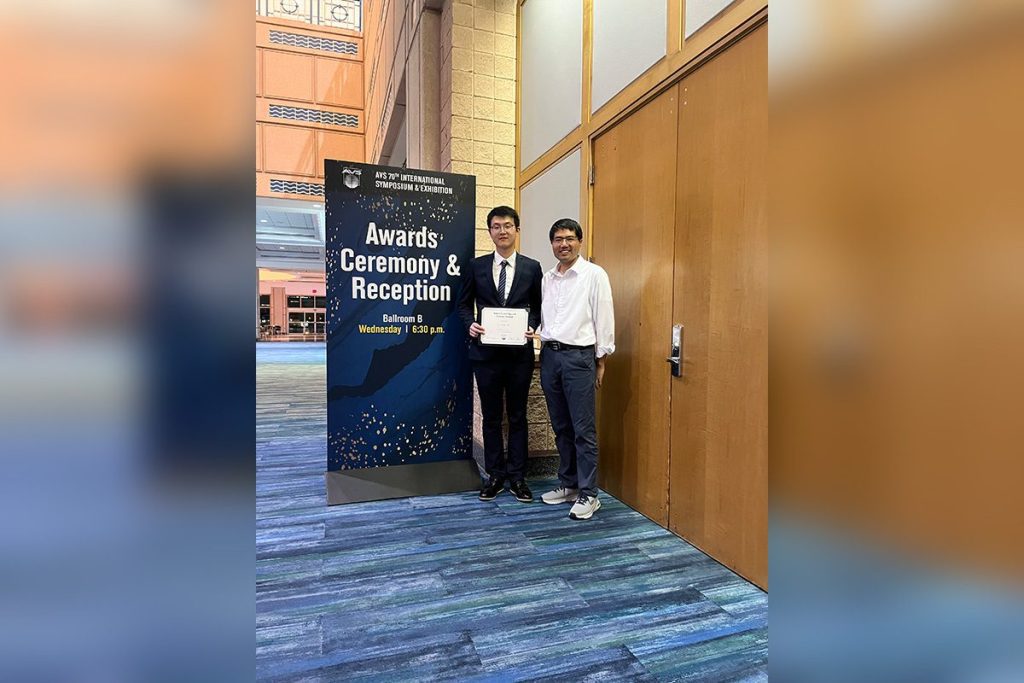UCF Doctoral Student Wins Russell and Singurd Varian Award
Kaige Shi has been recognized by the American Vacuum Society for his research to provide solutions for converting renewable electricity into chemical energy
By: Emily Dougherty | November 8, 2024

Photo courtesy of Kaige Shi.
Kaige Shi, a doctoral physics student, has been awarded the Russell and Singurd Varian Award from the American Vacuum Society (AVS) for his research about the effects of electrolyte cations on electrocatalytic reactions for the production of chemicals and fuels using renewable energy resources.
“My experience at UCF has been pivotal to my success. UCF Department of Physics is home to outstanding faculty, including my advisor Dr. Xiaofeng Feng and my collaborator Dr. Talat Rahman, who have been tremendous mentors,” Shi says. “UCF’s community of supportive faculty, researchers, and facilities, as well as the interdisciplinary research environment of the Renewable Energy and Chemical Transformations (REACT) cluster has been invaluable to my growth as a researcher. Without UCF’s resources and collaborative environment, I could not have achieved the AVS Russell and Sigurd Varian Award.”
Shi shared that he grew up in a small city in central China and his early interest in natural sciences forged a dream to become a physicist.
“Questions such as ‘what is the universe made of and how does it work?’ fascinated me,” Shi says.
His higher educational career brought him on a journey of studying at different universities while expanding his knowledge of physics and opening him up to new cultures, leading him to UCF for his Ph.D.
“I was fortunate to attend the Southern University of Science and Technology in Shenzhen, one of China’s most modern cities, where I majored in physics. My studies were further enriched by a sponsored exchange trip to London, which exposed me to Western culture, history, and society,” Shi says.
With more research of his own, Shi says that he found out he would be able to continue his education through the resources UCF offers to doctoral students.
“Though studying in the UK or U.S. seemed financially out of reach, I discovered that U.S. Ph.D. programs often offer assistantships that cover tuition and living expenses,” Shi says. “I am incredibly grateful to UCF for giving me this opportunity to pursue my dream and experience a diverse and vibrant world.”
He says the components of his research will impact the way the world uses its natural resources.
“Electrocatalytic reactions use catalysts to drive chemical reactions in a solution with electricity, an essential process for converting renewable energy sources into fuels and chemicals.” Shi says. “Electrolyte cations are positively charged ions in a solution that interact with the electrode surface during these chemical reactions.”
Shi says understanding these reactions is critical to making the limited resources on the earth more sustainable for future use.
“Developing efficient electrocatalysts is crucial for enabling renewable energy sources to produce fuels and chemicals sustainably,” he says. “While many research studies in the field focus on improving electrode materials, my work highlights the often overlooked role of electrolyte composition, especially cations, which significantly impact reaction rates. Understanding these processes helps us design more efficient electrocatalytic systems for sustainable energy solutions.”
Electricity is often viewed as the alternative energy source in place of fossil fuels. Shi says that his research will facilitate efficient utilization of renewable energy sources that won’t have the same harmful consequences as some nonrenewable sources.
“Electricity alone cannot power all sectors, such as transportation, where chemical energy remains essential,” Shi says. “My research aims to provide solutions for converting renewable electricity into chemical energy, which can then be used as fuels. This approach offers a path to reducing fossil fuel use while supporting critical applications that require chemical fuels.”

Kaige Shi (left) with his advisor and Associate Professor of Physics, Dr. Xiaofeng Feng (right), at the AVS Awards Ceremony and Reception in Tampa, FL.
Shi also supported UCF faculty in research for a grant award from the Department of Energy (DOE).
“I am deeply honored to have contributed to securing the DOE grant for Dr. Feng and Dr. Rahman. By providing key experimental data, I supported their application, helping demonstrate the significance of our research to a broad audience,” he says. “Knowing that my work played a role in earning this recognition from the Department of Energy makes me proud and reassures me of the value of our research. I am sincerely grateful to Dr. Rahman for her invaluable collaboration, exceptional support, and mentorship.”
Shi shared that he has spent his time outside of his research spreading the word about the opportunities and enjoyment that STEM can bring to students.
“Last November, I volunteered for UCF STEM Day as a representative of the physics department, by introducing students to physics through hands-on demonstrations,” Shi says. “For many students, outreach events can increase their exposure to STEM fields. These activities play a critical role in creating equal opportunities and nurturing the next generation of innovators.”
Shi says that sparking an interest in STEM field at an early age can promote and inspire students to be the next generation of scientists who will have a profound impact on society.
“It was rewarding to see the kids’ excitement and curiosity about the phenomena we discussed,” he says. “An early interest in STEM can foster curiosity, critical thinking, and problem-solving skills in young students. It also gives them a foundation to consider careers in fields that shape our future, like technology and environmental science.”
